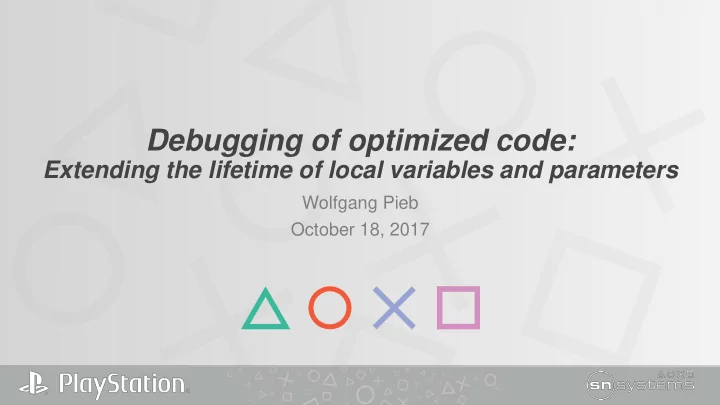

Debugging of optimized code: Extending the lifetime of local variables and parameters Wolfgang Pieb October 18, 2017
Motivation • Local variables and parameters (including the this pointer) are often optimized away soon after the last point of use. void A::func() { if (<last use of this >) { handle_error(); <= the this pointer is not visible in the debugger here } } • By artificially extending the lifetime of these locals and parameters through the end of their lexical scopes we make them visible for debugging purposes.
-O3 -g -O3 -fextend-lifetimes -g
Implementation • New clang switches -fextend-lifetimes and -fextend-this-ptr • New llvm intrinsic llvm.fake.use() define i32 @_Z3fooi(i32 %param) { … call void (...) @llvm.fake.use(i32 %param) } • The front-end issues calls to llvm.fake.use() for all user-defined local variables and parameters at the end of their respective lexical scopes. • With -fextend-this-ptr, only the this pointer’s lifetime is extended. • Analogous to generating of end-of-lifetime markers.
Example define void @foo(i32 %param ) … { extern void used(double); extern void usei(int); entry: double globd; %d = load double, double* @globd, align 8 … int globi; br i1 %tobool, label %if.end, label %if.then if.then void foo(int param) %j = load i32, i32* @globi { tail call void @usei(i32 %j) double d = globd; tail call void (...) @llvm.fake.use(i32 %j) <= after call to usei() if (param) { br label %if.end int j = globi; if.end: usei(j); tail call void @used(double %d) } tail call void (...) @llvm.fake.use(double %d) <= after call to used() used(d); tail call void (...) @llvm.fake.use(i32 %param) <= end of the function } ret void }
Backend implementation • llvm.fake.use() is translated into the new FAKE_USE machine op with the intrinsic’s argument as operand. • FAKE_USE is a meta instruction (i.e. does not produce any executable code). • Some GVN optimizations are suppressed for FAKE_USE operands. • SROA on pointer operands of FAKE_USE is disabled. • Type legalization needed to learn about FAKE_USE and its operands.
Effect on debug location information • Measuring coverage by determining the percentage of code that is covered within a variable’s lexical scope. variable’s first DEF Code range for Location information w/ -O3 -g variable’s parent scope Improvement w/ -O3 -g -fextend-lifetimes • Game 1: Cumulative coverage improvement by 15% • Game 2: Cumulative coverage improvement by 14%
Effect on runtime performance As percentage of execution time 110 105 100 -O3 95 -O3 -fextend-lifetimes -O3 -fextend-this-ptr 90 85 80 Game 1 Game 2 Bullet zlib
Conclusion • Debugging of optimized code can be improved by extending the lifetime of local variables and parameters artificially. • The impact on performance is small (5-7%). • Positive feedback from users. • The proposed -Og mode (optimize for debugging) could make use of this functionality.
Recommend
More recommend